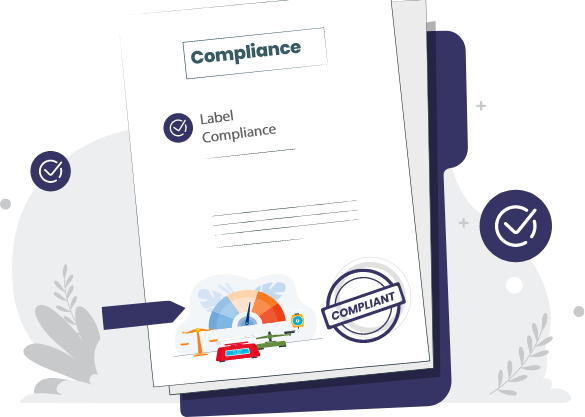CDSCO
FSSAI FOOD PRODUCT COMPLIANCE FOR FOOD SUPPLEMENTS & NUTRACEUTICALS
CliniExperts regulatory advisers help to evaluate all aspects from legal metrology product and packaging compliances for weighing and measuring instruments and devices to meet all the requirements in the form directives, regulations and standards stated by Legal Metrology.

FSSAI provides the guidelines that food businesses should adhere to. Failure to adhere to requirements of the Food Safety and Standard regulations or regulations that are prescribed can be punished with severe penalties. Because of the strict FSSAI regulations, obtaining a food license takes time and effort. We at the CliniExperts team are there for you for any assistance with completing your FSSAI food compliance for Food Supplements Nutraceutical and its registration aspects.
What Is FSSAI Food Compliance?
FSSAI Food Product compliance means the product meets the essential requirements through directives, standards and regulations laid down by FSSAI. It is for all the importers, manufacturers, marketers, sellers, and FBOs involved in the storage and distribution of food supplements and nutraceuticals. FSSAI Product compliance is regulated by the FSSAI and related bodies, such as Legal Metrology, as applicable to the product. The product compliance service aims to ensure that the product formulation and label comply with FSSAI norms. The process of making a product compliant involves the analysis of the formulation as per the FSSAI regulations. The applicant should determine the suitable product category based on its ingredients, additives, and target population. If required, the authorities might suggest reformulation or changes. Once the formulation is compliant, the label is analysed. Again, if there are any gaps in compliance, changes might be suggested. The food product compliance process will generally take approximately 15 working days. However, it also depends on the number of products, available client data and formulation complexity.

Number of Check Points
Are all ingredients and additives used compliant in terms of quality, quantity and product/supplement intended use and category?
Is the veg/non veg logo correctly provided on the label
Does the product have appropriate name, description, category etc.?
Is the nutritional profile complete and in correct format?
Are the addresses, FSSAI logo, Lic. No. correctly mentioned?
Are the ingredients listed correctly including additives, % declaration, if any.
Are all mandatory declarations such as sweeteners, polyols, oil, caffeine, analogues correctly mentioned?
Are all declarations and warnings for supplements, correctly mentioned?
Are dates, MRP, Batch No. correctly declared?
Is the product compliant in terms of RDA for different nutrients?
Why FSSAI Food Compliance Is Important
Product compliance is important to ensure that the product marketed, manufactured, or imported is compliant in all aspects to the norms of FSSAI. It should adhere to all standards and regulations, ensuring that it does not invite any penalties or legal action against the Food Business Operator (FBO). It would save a lot of time and money for the brand. It will also help in establishing a reliable brand.

Essential Tips
There are a few essential tips that may benefit when going for FSSAI food compliance:
All the ingredients and additives should be listed correctly.
The product must meet the quality standards laid down by FSSAI.
The product label must comply with the latest Food Safety and Standards (Labelling and Display) Regulations, 2020.
You may face problems in product compliance in the following cases:
The complete list of ingredients and additives is not provided.
The quantities are not provided, or quantitative compliance is not ensured correctly.
The changes suggested for the formulation or label are not implemented correctly.
Non-compliant products are launched in the market.
Expert Advise
CliniExperts provides the following advice regarding product compliance:
All ingredients, additives, quantities, and their functional roles should be declared to ensure compliance at the sub-ingredient or sub-component level.
Reformulation of the product should be done to a certain extent to avoid non-compliant ingredients or for value addition to avoid the NSF approval route.
Labels should provide the information in a compliant way.
Frequently Asked Questions
What happens if the product is non-compliant?
There are provisions relating to offences and penalties specified in the Food Act if the product is non-compliant. Here is a list of a few of them:
- A penalty of 5 lakhs on the manufacturer, seller, storage, distributor, and importer for sub-standard food.
- A penalty of 3 lakhs on the manufacturer, seller, storage, distributor, and importer for misbranded food.
- A penalty of 10 lakhs on the publisher or any person involved in publishing for a misleading advertisement describing false description, nature, or quality of substance.

What is the date of enforcement for the Food Safety and Standards (Labelling and Display) Regulation, 2020?
The timeline for mandatory compliance with the Food Safety and Standards (Labelling and Display) Regulation, 2020 was extended up to 1 July 2022. Failure to comply with this timeline can invite a penalty.

Are there any restrictions for combining ingredients specified in the supplement regulations?
There are no specific restrictions for combining ingredients. It is the responsibility of FBO to keep in mind the potential synergistic or antagonistic interactions amongst a combination of ingredients that can affect its stability, bioavailability, safety, and efficacy. FBOs must provide data on the scientific rationale for formulating such combinations based on scientific literature from peer-reviewed publications or data generated by FBOs, innovators or suppliers of such ingredients from their own clinical studies and submit to the authorities.

Is legal metrology compliance mandatory for Food products?
Yes, Legal Metrology compliance is applicable to all packaged food commodities.

Is there any provision for a tolerance limit for variation during sample analysis of the finished product?
Yes, these regulations provide a tolerance limit of plus/minus 20 per cent for variations from the declared value of the nutrients or nutritional ingredients during analysis.

